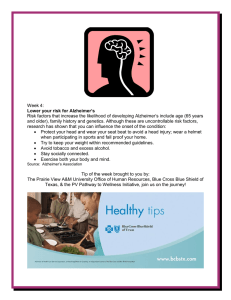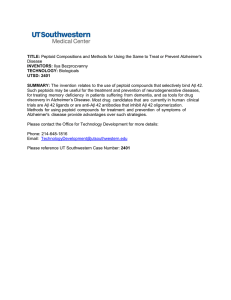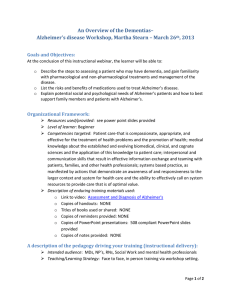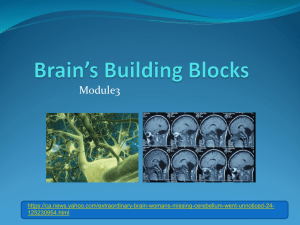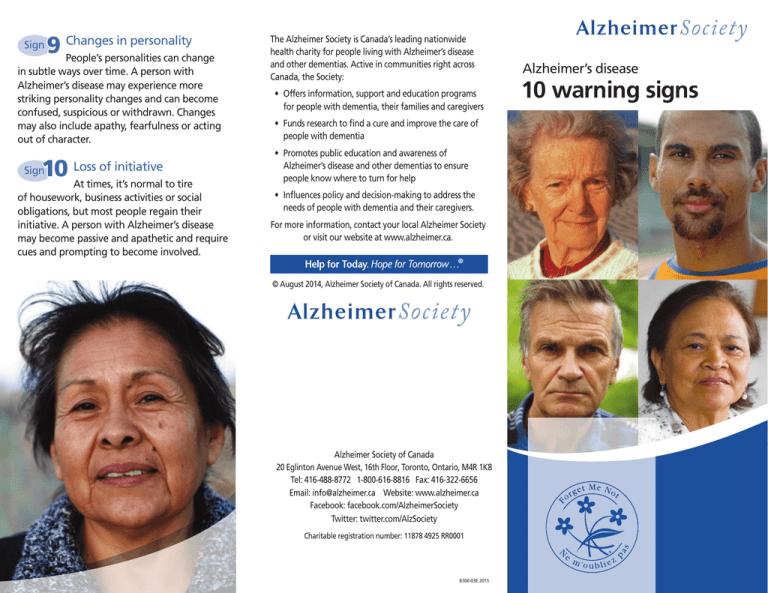
Sign
in personality
9 Changes
People’s personalities can change
in subtle ways over time. A person with
Alzheimer’s disease may experience more
striking personality changes and can become
confused, suspicious or withdrawn. Changes
may also include apathy, fearfulness or acting
out of character.
of initiative
10 Loss
At times, it’s normal to tire
Sign
of housework, business activities or social
obligations, but most people regain their
initiative. A person with Alzheimer’s disease
may become passive and apathetic and require
cues and prompting to become involved.
The Alzheimer Society is Canada’s leading nationwide
health charity for people living with Alzheimer’s disease
and other dementias. Active in communities right across
Canada, the Society:
• Offers information, support and education programs
for people with dementia, their families and caregivers
• Funds research to find a cure and improve the care of
people with dementia
• Promotes public education and awareness of
Alzheimer’s disease and other dementias to ensure
people know where to turn for help
• Influences policy and decision-making to address the
needs of people with dementia and their caregivers.
For more information, contact your local Alzheimer Society
or visit our website at www.alzheimer.ca.
© August 2014, Alzheimer Society of Canada. All rights reserved.
Alzheimer Society of Canada
20 Eglinton Avenue West, 16th Floor, Toronto, Ontario, M4R 1K8
Tel: 416-488-8772 1-800-616-8816 Fax: 416-322-6656
Email: info@alzheimer.ca Website: www.alzheimer.ca
Facebook: facebook.com/AlzheimerSociety
Twitter: twitter.com/AlzSociety
Charitable registration number: 11878 4925 RR0001
B300-03E 2015
Alzheimer’s disease
10 warning signs
Alzheimer’s disease is a progressive,
degenerative disease of the brain.
Symptoms include loss of memory,
difficulty with day-to-day tasks and
changes in mood and behaviour. People
may think these symptoms are part
of normal aging but they aren’t. If
you notice any of these symptoms or
changes in abilities or behaviour, it is
important to see a doctor. The changes
may be due to other conditions such
as depression, drug interactions or an
infection. If the diagnosis is Alzheimer’s
disease, an early diagnosis helps you get
the proper treatment, information and
support. Your local Alzheimer Society is
here to help.
To help you know what warning signs
to look for, the Alzheimer Society has
developed the following list:
Sign
10 warning signs
loss that affects
1 Memory
day-to-day abilities
Sign
It’s normal to occasionally forget appointments,
colleagues’ names or a friend’s phone number
and remember them later. A person with
Alzheimer’s disease may forget things more often
or have difficulty recalling information that has
recently been learned.
Sign
performing
2 Difficulty
familiar tasks
Busy people can be so distracted from time to
time that they may forget to serve part of a
meal and only remember later. A person with
Alzheimer’s disease may have trouble completing
tasks that have been familiar to them all their
lives, such as preparing a meal or playing a game.
Sign
with language
3 Problems
Everyone has trouble finding the right
word sometimes, but a person with Alzheimer’s
disease may forget simple words or substitute
words, making sentences difficult to understand.
Sign
Disorientation in time
4 and
space
It’s normal to forget the day of the week or your
destination - for a moment. But people with
Alzheimer’s disease can become lost on their own
street, not knowing how they got there or how
to get home.
judgment
5 Impaired
From time to time, people can make
questionable decisions such as putting off
seeing a doctor when they have an infection.
A person with Alzheimer’s disease may
experience changes in judgment or decisionmaking, for example not recognizing a medical
problem that needs attention or wearing
heavy clothing on a hot day.
Sign
with abstract
6 Problems
thinking
From time to time, people may have difficulty
with tasks that require abstract thinking,
such as balancing a chequebook. Someone
with Alzheimer’s disease may have significant
difficulties with such tasks, for example not
understanding what numbers are and how
they are used.
Sign
things
7 Misplacing
Anyone can temporarily misplace
a wallet or keys. A person with Alzheimer’s
disease may put things in inappropriate places:
an iron in the freezer or a wristwatch in the
sugar bowl.
Sign
in mood and
8 Changes
behaviour
Everyone becomes sad or moody from time
to time. Someone with Alzheimer’s disease
can exhibit varied mood swings - from calm to
tears to anger - for no apparent reason.
Is it Alzheimer’s disease?
Alzheimer’s disease is a progressive,
degenerative disease of the brain.
Symptoms include loss of memory,
difficulty with day-to-day tasks and
changes in mood and behaviour. People
may think these symptoms are part
of normal aging but they aren’t. If
you notice any of these symptoms or
changes in abilities or behaviour, it is
important to see a doctor. The changes
may be due to other conditions such
as depression, drug interactions or an
infection. If the diagnosis is Alzheimer’s
disease, an early diagnosis helps you get
the proper treatment, information and
support. Your local Alzheimer Society is
here to help.
To help you know what warning signs
to look for, the Alzheimer Society has
developed the following list:
Sign
10 warning signs
loss that affects
1 Memory
day-to-day abilities
Sign
It’s normal to occasionally forget appointments,
colleagues’ names or a friend’s phone number
and remember them later. A person with
Alzheimer’s disease may forget things more often
or have difficulty recalling information that has
recently been learned.
Sign
performing
2 Difficulty
familiar tasks
Busy people can be so distracted from time to
time that they may forget to serve part of a
meal and only remember later. A person with
Alzheimer’s disease may have trouble completing
tasks that have been familiar to them all their
lives, such as preparing a meal or playing a game.
Sign
with language
3 Problems
Everyone has trouble finding the right
word sometimes, but a person with Alzheimer’s
disease may forget simple words or substitute
words, making sentences difficult to understand.
Sign
Disorientation in time
4 and
space
It’s normal to forget the day of the week or your
destination - for a moment. But people with
Alzheimer’s disease can become lost on their own
street, not knowing how they got there or how
to get home.
judgment
5 Impaired
From time to time, people can make
questionable decisions such as putting off
seeing a doctor when they have an infection.
A person with Alzheimer’s disease may
experience changes in judgment or decisionmaking, for example not recognizing a medical
problem that needs attention or wearing
heavy clothing on a hot day.
Sign
with abstract
6 Problems
thinking
From time to time, people may have difficulty
with tasks that require abstract thinking,
such as balancing a chequebook. Someone
with Alzheimer’s disease may have significant
difficulties with such tasks, for example not
understanding what numbers are and how
they are used.
Sign
things
7 Misplacing
Anyone can temporarily misplace
a wallet or keys. A person with Alzheimer’s
disease may put things in inappropriate places:
an iron in the freezer or a wristwatch in the
sugar bowl.
Sign
in mood and
8 Changes
behaviour
Everyone becomes sad or moody from time
to time. Someone with Alzheimer’s disease
can exhibit varied mood swings - from calm to
tears to anger - for no apparent reason.
Is it Alzheimer’s disease?
Alzheimer’s disease is a progressive,
degenerative disease of the brain.
Symptoms include loss of memory,
difficulty with day-to-day tasks and
changes in mood and behaviour. People
may think these symptoms are part
of normal aging but they aren’t. If
you notice any of these symptoms or
changes in abilities or behaviour, it is
important to see a doctor. The changes
may be due to other conditions such
as depression, drug interactions or an
infection. If the diagnosis is Alzheimer’s
disease, an early diagnosis helps you get
the proper treatment, information and
support. Your local Alzheimer Society is
here to help.
To help you know what warning signs
to look for, the Alzheimer Society has
developed the following list:
Sign
10 warning signs
loss that affects
1 Memory
day-to-day abilities
Sign
It’s normal to occasionally forget appointments,
colleagues’ names or a friend’s phone number
and remember them later. A person with
Alzheimer’s disease may forget things more often
or have difficulty recalling information that has
recently been learned.
Sign
performing
2 Difficulty
familiar tasks
Busy people can be so distracted from time to
time that they may forget to serve part of a
meal and only remember later. A person with
Alzheimer’s disease may have trouble completing
tasks that have been familiar to them all their
lives, such as preparing a meal or playing a game.
Sign
with language
3 Problems
Everyone has trouble finding the right
word sometimes, but a person with Alzheimer’s
disease may forget simple words or substitute
words, making sentences difficult to understand.
Sign
Disorientation in time
4 and
space
It’s normal to forget the day of the week or your
destination - for a moment. But people with
Alzheimer’s disease can become lost on their own
street, not knowing how they got there or how
to get home.
judgment
5 Impaired
From time to time, people can make
questionable decisions such as putting off
seeing a doctor when they have an infection.
A person with Alzheimer’s disease may
experience changes in judgment or decisionmaking, for example not recognizing a medical
problem that needs attention or wearing
heavy clothing on a hot day.
Sign
with abstract
6 Problems
thinking
From time to time, people may have difficulty
with tasks that require abstract thinking,
such as balancing a chequebook. Someone
with Alzheimer’s disease may have significant
difficulties with such tasks, for example not
understanding what numbers are and how
they are used.
Sign
things
7 Misplacing
Anyone can temporarily misplace
a wallet or keys. A person with Alzheimer’s
disease may put things in inappropriate places:
an iron in the freezer or a wristwatch in the
sugar bowl.
Sign
in mood and
8 Changes
behaviour
Everyone becomes sad or moody from time
to time. Someone with Alzheimer’s disease
can exhibit varied mood swings - from calm to
tears to anger - for no apparent reason.
Is it Alzheimer’s disease?
Sign
in personality
9 Changes
People’s personalities can change
in subtle ways over time. A person with
Alzheimer’s disease may experience more
striking personality changes and can become
confused, suspicious or withdrawn. Changes
may also include apathy, fearfulness or acting
out of character.
of initiative
10 Loss
At times, it’s normal to tire
Sign
of housework, business activities or social
obligations, but most people regain their
initiative. A person with Alzheimer’s disease
may become passive and apathetic and require
cues and prompting to become involved.
The Alzheimer Society is Canada’s leading nationwide
health charity for people living with Alzheimer’s disease
and other dementias. Active in communities right across
Canada, the Society:
• Offers information, support and education programs
for people with dementia, their families and caregivers
• Funds research to find a cure and improve the care of
people with dementia
• Promotes public education and awareness of
Alzheimer’s disease and other dementias to ensure
people know where to turn for help
• Influences policy and decision-making to address the
needs of people with dementia and their caregivers.
For more information, contact your local Alzheimer Society
or visit our website at www.alzheimer.ca.
© August 2014, Alzheimer Society of Canada. All rights reserved.
Alzheimer Society of Canada
20 Eglinton Avenue West, 16th Floor, Toronto, Ontario, M4R 1K8
Tel: 416-488-8772 1-800-616-8816 Fax: 416-322-6656
Email: info@alzheimer.ca Website: www.alzheimer.ca
Facebook: facebook.com/AlzheimerSociety
Twitter: twitter.com/AlzSociety
Charitable registration number: 11878 4925 RR0001
B300-03E 2015
Alzheimer’s disease
10 warning signs
Sign
in personality
9 Changes
People’s personalities can change
in subtle ways over time. A person with
Alzheimer’s disease may experience more
striking personality changes and can become
confused, suspicious or withdrawn. Changes
may also include apathy, fearfulness or acting
out of character.
of initiative
10 Loss
At times, it’s normal to tire
Sign
of housework, business activities or social
obligations, but most people regain their
initiative. A person with Alzheimer’s disease
may become passive and apathetic and require
cues and prompting to become involved.
The Alzheimer Society is Canada’s leading nationwide
health charity for people living with Alzheimer’s disease
and other dementias. Active in communities right across
Canada, the Society:
• Offers information, support and education programs
for people with dementia, their families and caregivers
• Funds research to find a cure and improve the care of
people with dementia
• Promotes public education and awareness of
Alzheimer’s disease and other dementias to ensure
people know where to turn for help
• Influences policy and decision-making to address the
needs of people with dementia and their caregivers.
For more information, contact your local Alzheimer Society
or visit our website at www.alzheimer.ca.
© August 2014, Alzheimer Society of Canada. All rights reserved.
Alzheimer Society of Canada
20 Eglinton Avenue West, 16th Floor, Toronto, Ontario, M4R 1K8
Tel: 416-488-8772 1-800-616-8816 Fax: 416-322-6656
Email: info@alzheimer.ca Website: www.alzheimer.ca
Facebook: facebook.com/AlzheimerSociety
Twitter: twitter.com/AlzSociety
Charitable registration number: 11878 4925 RR0001
B300-03E 2015
Alzheimer’s disease
10 warning signs

